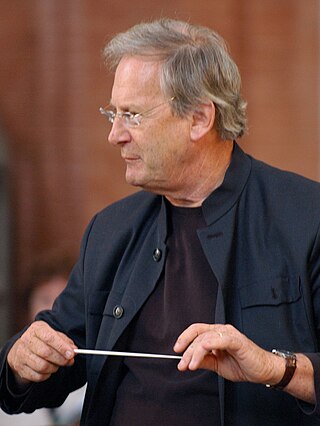Related Research Articles

1712 (MDCCXII) was a leap year starting on Friday of the Gregorian calendar and a leap year starting on Tuesday of the Julian calendar, the 1712th year of the Common Era (CE) and Anno Domini (AD) designations, the 712th year of the 2nd millennium, the 12th year of the 18th century, and the 3rd year of the 1710s decade. As of the start of 1712, the Gregorian calendar was 11 days ahead of the Julian calendar, which remained in localized use until 1923.

Sir John Eliot Gardiner is an English conductor, particularly known for his performances of the works of Johann Sebastian Bach, especially the Bach Cantata Pilgrimage of 2000, performing Bach's church cantatas in liturgical order in churches all over Europe, and New York City, with the Monteverdi Choir, and recording them at the locations.

Frederick Howard, 5th Earl of Carlisle was a British peer, statesman, diplomat, and author.

Admiral Charles Middleton, 1st Baron Barham, PC was a Royal Navy officer and politician. As a junior officer he saw action during the Seven Years' War. Middleton was given command of a guardship at the Nore, a Royal Navy anchorage in the Thames Estuary, at the start of the American War of Independence, and was subsequently appointed Comptroller of the Navy. He went on to be First Naval Lord and then First Lord of the Admiralty.

Admiral Augustus Keppel, 1st Viscount Keppel, PC was a British Royal Navy officer and politician who sat in the House of Commons from 1755 to 1782. He saw action in command of various ships, including the fourth-rate Maidstone, during the War of the Austrian Succession. He went on to serve as Commodore on the North American Station and then Commander-in-Chief, Jamaica Station during the Seven Years' War. After that he served as Senior Naval Lord and then Commander-in-Chief of the Channel Fleet.

William Eliot, 2nd Earl of St Germans, known as William Elliot until 1823, was a British diplomat and politician.

Granville Leveson-Gower, 1st Marquess of Stafford, KG PC, known as Viscount Trentham from 1746 to 1754 and as The Earl Gower from 1754 to 1786, was a British politician from the Leveson-Gower family. Sitting in the House of Lords, he spent a quarter of a century in the Cabinet.
George Beauclerk, 3rd Duke of St Albans, styled Earl of Burford until 1751, was a British peer.

HMS Drake was a Royal Navy 14-gun ship rigged sloop-of-war with a displacement of 275 tons burthen. Originally named the Royal Oak, she was built in New England in 1775 by John Wharton from Philadelphia. She first sailed between London and Stettin as a tobacco-ship. She was then sold in 1776 and renamed Resolution. Captained by Edward Hawker, the ship traded between London, Boston, and Cork. On 4 March 1777 the British navy purchased her at Plymouth for 3,000 pounds sterling. She completed fitting out as a warship on 24 May 1777. She became the ship-rigged sloop-of-war Drake with either 14, 18 or 20 guns. From July 17, 1777, she served in the American Revolutionary War. Her first mission was protecting the packet-boats between Harwich and Gorée

George Legge, 3rd Earl of Dartmouth KG, PC, FRS, styled Viscount Lewisham until 1801, was a British politician who sat in the House of Commons from 1778 to 1784.

The 72nd Highlanders was a British Army Highland Infantry Regiment of the Line. Raised in 1778, it was originally numbered 78th, before being redesignated the 72nd in 1786. Under the Childers Reforms it amalgamated with the 78th (Highlanders) Regiment to form the 1st Battalion of the Seaforth Highlanders in 1881.

Sir John Aubrey, 6th Baronet was a British Tory politician. In 1786, he succeeded to his father's baronetcy.
There have been two baronetcies created for persons with the surname Hawkins, both in the Baronetage of Great Britain. One creation is extant as of 2008.
Sir John Eliot, 1st Baronet was a Scottish physician and Physician to the Prince of Wales.
John Eliot may refer to:
Events from the year 1714 in Scotland.
References
- ↑ "No. 11894". The London Gazette . 25 July 1778. p. 1.